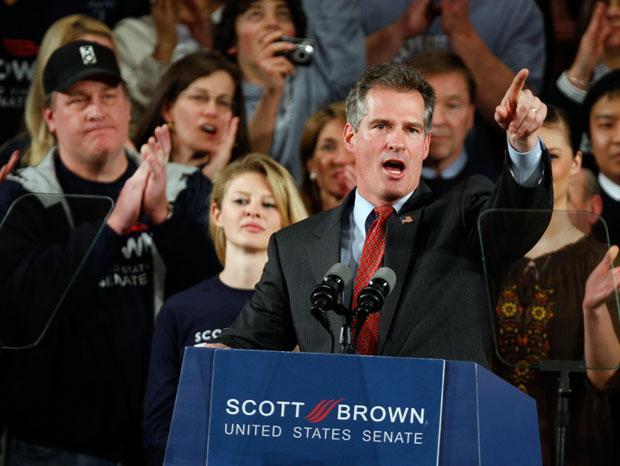Advertisement
The Republican Candidate Rejects A Republican Idea: Cap And Trade

You've heard of cap and trade. It would go like this: A cap gets put on the total amount of greenhouse gases the U.S. can emit. Companies get permits to emit greenhouse gases. If they need more, they have to buy them from other companies that pollute less.
At their last debate, Scott Brown blasted his Democratic opponent, Attorney General Martha Coakley, for supporting it.
"You're in favor of cap and trade, which is a national energy tax," Brown said to Coakley.
"It's not a tax," Coakley replied.
"It's a tax," Brown insisted.
Senate Democrats support cap and trade. I asked Brown about his opposition to it last month, at a campaign stop in Medfield.
"If we don't use cap and trade, how do we reduce emissions?" I wondered.
"You can reduce by conservation, wind, solar, hydroelectric, nuclear," Brown told me. "You can provide a total package and let people have different avenues and different ways to heat and light their businesses. How does government enforce that? They have their hands in pretty much everything. I'm sure there'll be a role for government — and at some point, government needs to get out of the way, as well."
What you won't hear in one of Brown's campaign speeches is that cap and trade is actually an idea first championed by a Republican president.
Fred Krupp, the president of the Environmental Defense Fund, remembers getting an invitation from Vice President George H.W. Bush's office to come up with a market mechanism to control acid rain.
"His counsel, Boyden Gray, invited the Environmental Defense Fund to help put together a practical idea that would reduce sulphur dioxide emissions," Krupp recalled. "And that was to become the first big-scale use of cap and trade."
And, Krupp said, the cap and trade system worked. For example, it helped clean up the streams in the White Mountains of New Hampshire.
The Hubbard Brook Experimental Forest is where someone first figured out that there is something called acid rain in North America. Scientist have been measuring the changes in the acidity of some of the streams here. They also measure the changes in acidity of the rainwater.
Geoff Wilson is the forest's program director. "We can say for sure that the acidity of the rainwater has become less over time and the acidity of the stream water has become less over time," Wilson said.
Acid rain here is still a problem, but not as bad as it used to be.
"The use of emissions trading on acid rain has been the single biggest achievement in environmental policy, probably in the last 20 years," said Krupp, the president of the Environmental Defense Fund. "The reason is: suddenly we aligned the profit motive with reducing sulphur emissions."
Those sulphur emissions were one of the causes of acid rain. So if cap and trade worked to reduce acid rain, why are so many Republicans, including Scott Brown, against using it to cut greenhouse gases?
Tufts University Political Science Professor Jeff Berry says cap and trade has become a red-meat issue for the right because President Obama is for it. "And Scott Brown is running as a national Republican, not a Massachusetts Republican, so he's hewing close to the conservative line," Berry said.
There's also the issue of whether global warming is a problem. Seth Kaplan, of the Conservation Law Foundation, said some Republicans don't believe that it is. "And since they don't think global warming is a problem, they are not inclined to look for a solution," Kaplan said.
Scott Brown says he's not sure global warming is caused by human activity. But even if he was, he and other Republicans see other problems with implementing cap and trade now.
Jim Stergios served as undersecretary for policy in the Executive Office of Environmental Affairs under Gov. Mitt Romney. "In the immediate term, everybody's worried about increasing prices, and I think everyone agrees that cap and trade — whether you're for it or against it — will increase prices," Stergios said. "They're also quite concerned about the impact on the job picture in the short term."
So while the Democratic candidate, Martha Coakley, ends up embracing an idea first implemented by a Republican president, the Republican candidate, Scott Brown, ends up rejecting it.
This program aired on January 18, 2010. The audio for this program is not available.
